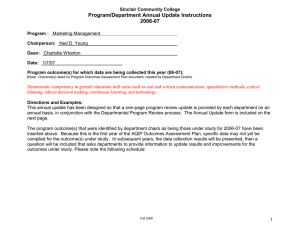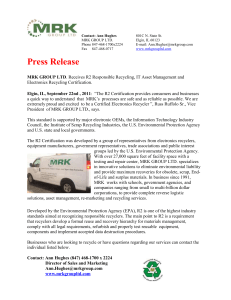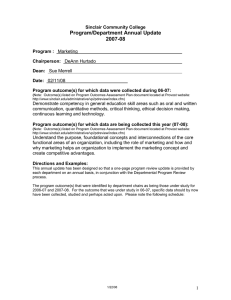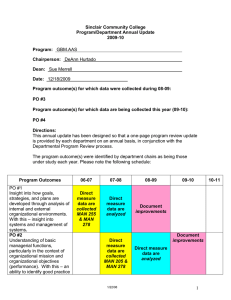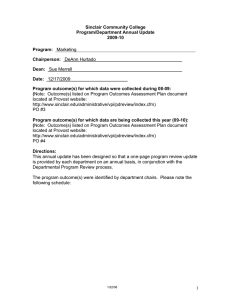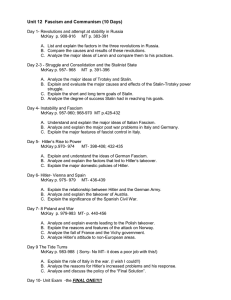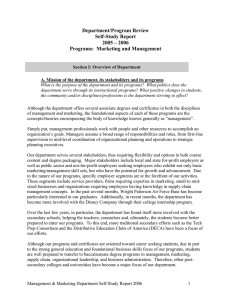Program/Department Annual Update 2008-09
advertisement
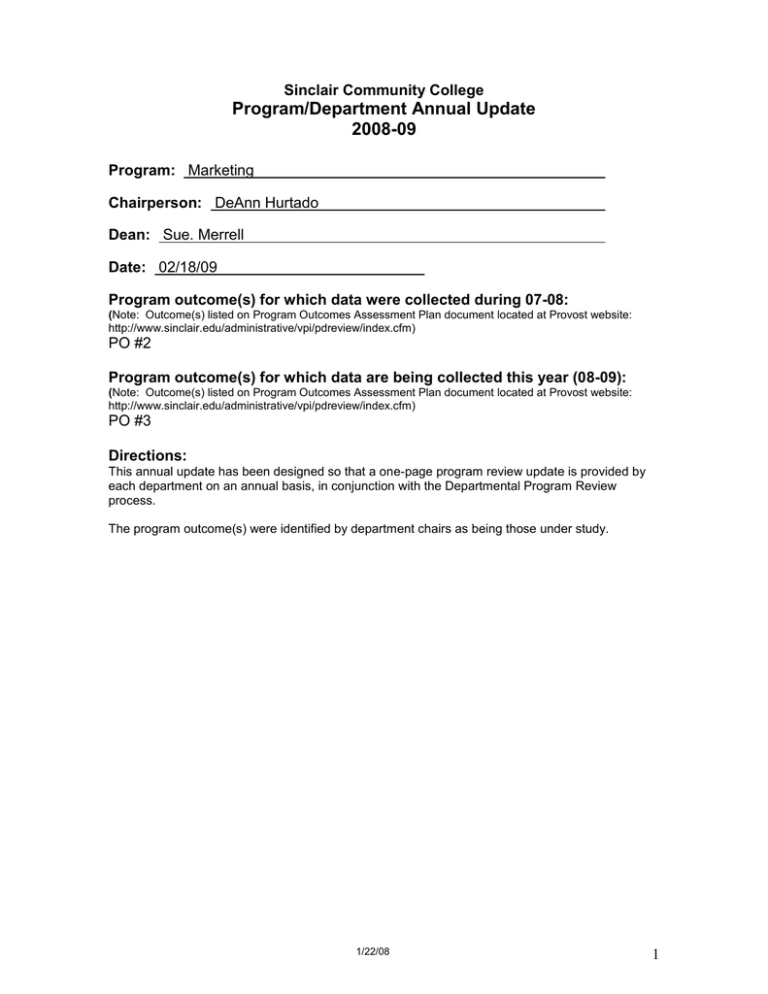
Sinclair Community College Program/Department Annual Update 2008-09 Program: Marketing Chairperson: DeAnn Hurtado Dean: Sue. Merrell Date: 02/18/09 Program outcome(s) for which data were collected during 07-08: (Note: Outcome(s) listed on Program Outcomes Assessment Plan document located at Provost website: http://www.sinclair.edu/administrative/vpi/pdreview/index.cfm) PO #2 Program outcome(s) for which data are being collected this year (08-09): (Note: Outcome(s) listed on Program Outcomes Assessment Plan document located at Provost website: http://www.sinclair.edu/administrative/vpi/pdreview/index.cfm) PO #3 Directions: This annual update has been designed so that a one-page program review update is provided by each department on an annual basis, in conjunction with the Departmental Program Review process. The program outcome(s) were identified by department chairs as being those under study. 1/22/08 1 Program Outcomes PO #1 Demonstrate competency in general education skill areas such as oral and written communication, quantitative methods, critical thinking, ethical decision making, continuous learning, and technology. PO #2 Understand the purpose, foundational concepts, and interconnections of the core functional areas of an organization, including the role of marketing and how and why marketing helps an organization to implement the marketing concept and create competitive advantages. Use the marketing planning process and work within the marketing environments to develop effective marketing tactics, strategies, and plans – including selection of appropriate target markets and development of detailed product, promotion, price, and place mixes – which satisfy target customer needs and organizational objectives in context of a global and ever-changing marketplace. PO #3 Understand and apply appropriate management principles to be an effective marketing employee within a variety of organizational settings. This would include demonstrating competency in areas such as teaming, leadership, followership, time management, project management, motivation, negotiation, and planning. Demonstrate an understanding and familiarization with marketing terminology including key concepts such as: (1) The types of marketing, (2) Marketing strategy decisions and implications, (3) Relationships between marketing strategies and financial outcomes, and (4) Ethical issues facing marketers PO #4 Locate sources of relevant secondary information, manage basic primary research projects, and be able to analyze and use information to solve marketing related problems. PO #5 Know the psychological, social, and situational factors which influence consumers when making purchase decisions and how these factors relate to the creation of effective marketing strategies. PO #6 Understand the strengths, weaknesses and appropriate uses of key marketing communication functions (advertising, public relations, sales promotion, personal selling, and specialized media) in order to design effective brand messages that are integrated with other marketing activities. 06-07 07-08 08-09 09-10 10-11 Direct measure data are collected MRK 295 Direct measure data are analyzed Document improvements Direct measure data are collected MRK 202 Direct measure data are analyzed Document improvements Direct measure data are collected MRK 295 MRK 245 Direct measure data are analyzed Document improvements Direct measure data are collected MRK 235 Direct measure data are analyzed Direct measure data are collected MRK 236 Direct measure data are collected MRK 215 MRK 225 1/22/08 2 Please e-mail this completed form to angie.didier@sinclair.edu by March 3, 2009. Thank you. Please list noteworthy changes in the data set from last year: Marketing degree completion is up by 114% from the previous year. Marketing enrollment is currently 46% of last year’s enrollment. This significant decrease is due to the TAG required pre-requisite of ECO 218 now required prior to enrollment in MRK 201. This has severely impacted both MRK 201 and MRK 202 enrollment. Prior to Fall 2009 when the TAG requirement came into effect, the department chose to remove pre-requisite courses from any of the other MRK classes in order to retain some enrollment in the MRK program. This appears to have been somewhat successful, in that MRK 236, Consumer Behavior; enrollment is up by over 100% from this time last year. Students changed their enrollment pattern and departments that previously required MRK 201 in their programs changed the Marketing requirement to MRK 236. This planned changed happened as a result of timely communication between department chairpersons. Please list the actions and/or improvement priorities underway from the most recent program review recommendations: As previously mentioned, the TAG pre-requisite of ECO 218 is now in effect prior to students’ taking MRK 201 and then MRK 202. Enrollment in the MRK program has suffered. Current Winter 09 enrollment in ECO 218 is up 50% from this time last year, which may indicate students are trying to complete ECO 218 in order to enroll in MRK 201. The Marketing department unexpectedly lost two fulltime faculty members in Fall 2008. This has resulted in the remaining fulltime members picking up courses they usually did not teach. It was also necessary to hire additional adjunct instructors to cover the specialty Marketing courses formerly taught by the departing Marketing faculty. Efforts are currently underway to strengthen the Marketing capstone course by deleting the stand-alone Marketing capstone and building it into the new MAN 279 capstone course for Fall 2009. Program outcome(s)--data collected in 06-07 PO #1 – Related to MRK 295 Capstone What actions/improvements are underway as a result of your data analysis? General Education rubric measures have been built into the MRK 295 course. Results to be tabulated after Spring 2009 quarter. There was a decrease in student satisfaction data between 1998 and 2006. Student satisfaction in the area of “Courses scheduled convenient” was down 6%, but only 3 students responded to the 2006 survey. However, based upon that data and anecdotal information from students, the MRK 295 course will be deactivated Fall 2009 and MRK students will take the new MAN 279 capstone course, required for all MAN/MRK program majors. This will allow the department to offer the capstone courses more often and will allow students to work together across from across the business curriculum to complete the capstone project. 1/22/08 3 Program outcome(s)--data collected in 07-08 PO #2 – MRK 202 How have you analyzed the data collected? What did you find? Describe the results obtained. MRK 202 was the course where data was collected under the Program Outcome #2. A pre/post test was developed to measure student knowledge prior to the course and again after completing the course. Student on the pre vs. post test show an increase in correct answer in every question asked. On average, students showed a 10% increase in correct answers for each question. This would indicate that while students need to retain more of what they learn, or perhaps the teaching methods used need to more frequently reinforce prior learning, students are learning and retaining information learned in class. Program outcome(s)—data collected for 08-09 For the outcome(s) currently under study (for 08-09 outcomes), what evidence and process do you plan to use to determine the extent to which this/these program outcome(s) have been met? Development of a new capstone rubric and curriculum for MAN 279 to replace MRK 295 project and rubric. A student exit survey will also be part of the outcome assessment and used to make improvements. Development of a grading rubric and presentation rubric for MRK 245 Results will be analyzed and needed changes determined. Note: Next year, you will be asked to describe the analysis (08-09 outcomes), and actions/improvements underway (07-08 outcomes). General Education Describe any general education changes/improvements in your program/department during this past academic year (07-08). The department had two fulltime faculty members leave this school year. They have not been replaced and their load has been assumed by other fulltime and adjunct faculty. This resulted in loss of data for the upper level MRK courses and lack of consistency in program improvement. We need to regroup and again determine course outcomes and appropriate assessment methods within the ranks of the remaining faculty. This will begin in Spring 09. A general education rubric is currently used to assess students in the MRK capstone course. This course is taught only in spring quarter; therefore the latest results are not yet available. However, oral and written communication and teaming are expected during this project. 1/22/08 4
